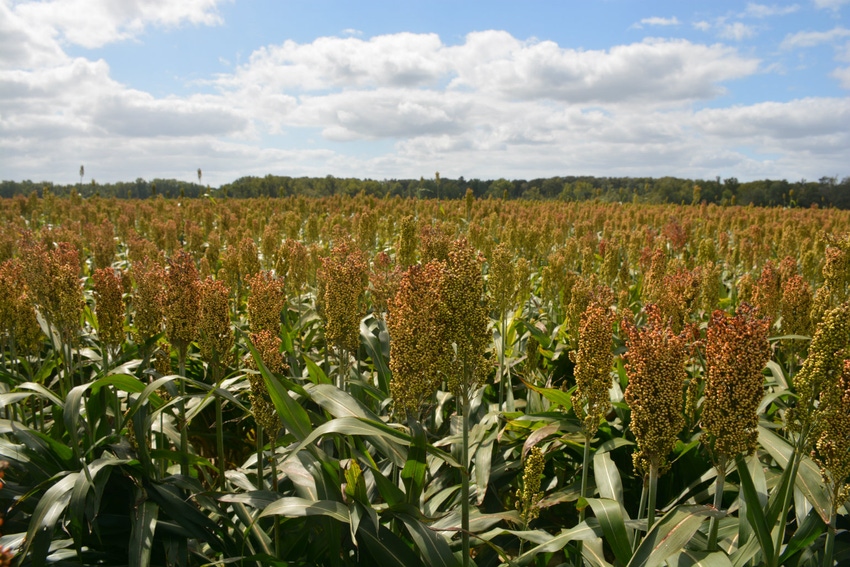
A workshop for stakeholders to be held at the North Carolina Biotechnology Center in Research Triangle Park on Feb. 12 will help set pest management priorities for the fledging sorghum industry in North Carolina and surrounding states.
The Southern Integrated Pest Management (IPM) Center has provided a grant to fund the event, and also to develop a pest management strategic plan for the Mid-Atlantic region. The grant was awarded to the Crop Commercialization Program (CCP) at the North Carolina Biotechnology Center (NCBiotech). NCBiotech will also host the workshop.
The Southern IPM Center is housed at North Carolina State University in collaboration with the University of Georgia and Auburn University. It works with a variety of stakeholders – including Extension agents, growers, government agencies, and researchers – to support pest management research, education and outreach in the South.
The CCP, which promotes new, high-value crop research in North Carolina, will coordinate the workshop and lead development of the strategic plan.
“Our mission is to find opportunities to increase our farmers’ profits and strengthen our agribusiness sector to support rural economic development,” said Paul Ulanch, Ph.D., MBA, executive director of CCP. “Sorghum is not typically grown in North Carolina – only about 18,000 acres were planted here in 2018,” he pointed out. “But it’s a crop that has the potential to expand significantly and to attract industry to the state. So it’s important now to focus on pest management.”
A diverse group – growers, extension agents, academics, regulators, and industry and commodity association representatives – is expected to participate in the one-day workshop. They’ll examine production practices and pest management issues. The goal is to incorporate information from the meeting and other sorghum pest management studies into a strategic framework – a pest management strategic plan (PMSP) – that will guide future crop decisions and activities in the Mid-Atlantic region (North and South Carolina and Virginia).
The strategic plan will outline priorities for sorghum research, regulation and outreach, according to Sarah Frank, NCBiotech’s project administrator for CCP. That includes guiding a wide range of activities, from the registration of pesticides by the U.S. Environmental Protection Agency to the allocation of funds for research and other pest management activities. To date, a PMSP has not been developed for sorghum in the region, she said.
Danesha Seth Carley, Ph.D., director of the Southern IPM Center, said her organization is “looking forward to working with NCBiotech to support the flow of information and resources for this important sorghum project. A well-thought-out pest management strategic plan is crucial to enhance environmental, economic and human health,” she added.
The effort is the latest in a multi-year collaboration to investigate ways to expand sorghum production in North Carolina, both as a feed for hogs and other livestock and as a source of biomass for ethanol.
Sorghum grows tall like corn but is more drought resistant, so it can be a reliable alternative in those areas of the state where sandy soil can’t hold enough moisture for corn during dry growing seasons.
Increasing the crop’s acreage also has the potential to make North Carolina’s huge pork industry more self-sustaining. Farmers currently produce less than a third of the 300 million bushels of animal feed the state’s pork and poultry producers require annually. The remainder must be shipped from the Midwest and other locations.
Sorghum also allows for the application of different herbicides and can be used as a valuable rotational crop, particularly to control nematodes.
Crop rotation is one of a number of topics that will be discussed during the workshop, which follows close on the heels of two other multi-year sorghum initiatives led by NCBiotech. The Mid-Atlantic Feed Grain Project – funded from 2015-2017 by the North Carolina Pork Council, the Golden LEAF Foundation and pork producer Murphy-Brown LLC– focused on increasing production of animal feed from grain crops in the region by more than 50 percent.
Another three-year, $1.87 million grant from the United States Department of Agriculture’s Bioenergy Research Development Initiative supports the study of sorghum as biomass for fuel and high-value chemicals in North Carolina and surrounding states. CCP was the grant recipient. This project, which concludes in 2020, brings together North Carolina’s two largest economic drivers – agriculture and biotechnology – to maximize fibrous sorghum stalk material for use as a high-value product.
Information from these two initiatives will be incorporated into the pest management strategic plan. “We’ll be able to determine what’s most important in terms of sorghum crop management,” Frank said. “And we can help set the priorities for what we hope will be a steadily growing agricultural segment in our state and the region.”
“Sorghum production opens the doors to new market opportunities and provides us with another key crop for rotation,” Ulanch pointed out. “We think it will have a positive impact on growers in our state in the future.”
Source: The North Carolina Biotechnolgy Center, which is solely responsible for the information provided and is wholly owned by the source. Informa Business Media and all its subsidiaries are not responsible for any of the content contained in this information asset.
About the Author(s)
You May Also Like




